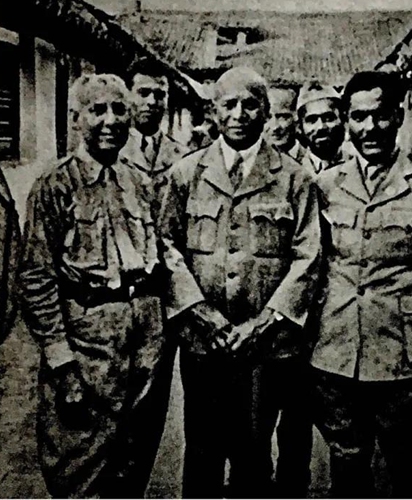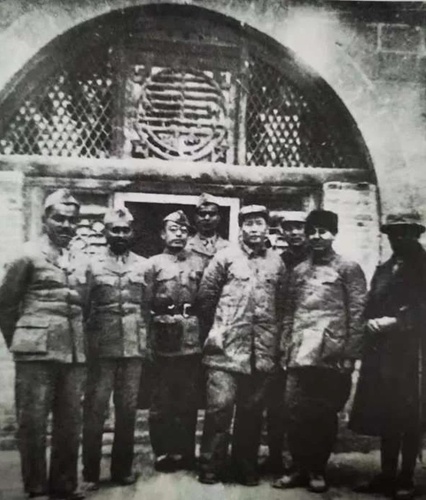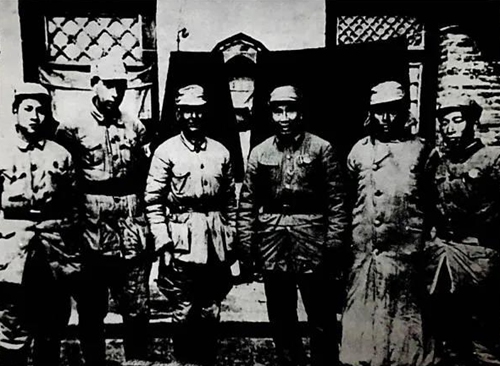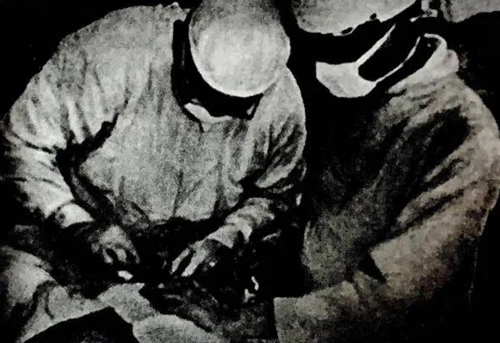




- BRNN
- BRI News
- BRNN News
- Database
Official Documents Polices and Regulations
Inter-government Documents International Cooperation BRI Countries
Business Guide Economic Data BRI Data
Trade
Investment Projects Latest projects
Cases - Content Pool
On July 7, 1942, five years after China began a full-scale war of resistance against Japanese aggression, a young Indian doctor solemnly swore to the red flag to join the Communist Party of China (CPC). He was then on the battlefront of the Shanxi-Chahar-Hebei border region. After taking the oath, he declared excitedly that he would fight with the army and the people in the liberated areas till his last breath. His name was Dwarkanath Kotnis, or Ke Dihua in Chinese. The soldiers of the Eighth Route Army and the villagers liked to call him Old Ke.

Members of the Indian Medical Team to China
Old Ke's bond with China began with a letter from Zhu De, then Commander-in-Chief of the Eighth Route Army, to Jawaharlal Nehru, the leader of the Indian National Congress, asking for material and medical assistance from India. The Army was in acute shortage of doctors and medicine as the war raged on in China. Upon receiving the letter, the Indian side immediately assembled and sent a medical team of five doctors to China amid the flames of war. Dr. Kotnis was one of them.

Group photo of Mao Zedong and all members of the Indian Medical Team to China including Dr. Kotnis (second from left) in 1938

Group photo of Zhu De and members of the Indian Medical Team to China including Dr. Kotnis (second from right)
Before leaving for China, the team had heard that the CPC was different from the Kuomintang, and therefore when they arrived, they asked to go to the CPC-led battlefield behind the enemy lines, and work where the Chinese people suffered the most. With unrelenting persuasion, Dr. Kotnis finally arrived at the Shanxi-Chahar-Hebei border region and became a battlefront doctor, performing surgeries on the firing line.
Fighting shoulder to shoulder with CPC members and the Eighth Route Army, Old Ke became well-known in the Shanxi-Chahar-Hebei border region. Considering himself a real soldier of the Eighth Route Army, he fully blended in with the struggle and life of the liberated areas.
For him, the CPC-led war against Japanese aggression was a great, revolutionary fight for justice, and the Eighth Route Army was like an excellent university turning out tens of thousands of revolutionary youths. He found out that the anti-Japanese base areas led by the CPC were totally different from the Kuomintang-controlled areas. People there lived as equals. Officers and soldiers were no different. Soldiers could participate in discussions on major issues or criticize their superiors. Officers, soldiers and staff received almost the same allowance: according to him, a commander of a hundred-thousand-strong troop only has five rupees a month, while an ordinary soldier can get three rupees. There was neither extreme disparity between the rich and the poor like the situation in Kuomintang-controlled areas, nor strict stratification like the caste system in India.
All this changed Dr. Kotnis profoundly. In his letter to Dr. Basu, who was also on the medical team, he wrote with excitement that he had been "experiencing a good deal of transformation" in his "character" and "ideas", and that he had gotten rid of his bad habits, including his "bourgeois ideas". When the Indian government sent a telegram to the battlefront, urging him to return, he pled with the local officials in charge to let him stay. He noted that the war against Japanese aggression led by Mao Zedong and the CPC was a great fight. He had fallen in love with the cause of the CPC and the base areas behind the enemy lines, and no matter what may come, he would fight together with the Chinese till the final victory is secured.
On July 7, 1942, Dr. Kotnis became a proud member of the CPC and one of the proletarian vanguards. After joining the Party, he devoted all his time to saving lives, despite suffering from pain and illness himself. On December 9, 1942, worn out by overwork, Dr. Kotnis passed away in illness on the Chinese soil. He was then at the age of 32.

Dr. Kotnis works at the Bethune International Peace Hospital
In his eulogy, Chairman Mao Zedong wrote, "Dr. Kotnis, our Indian friend, came to China from afar to assist us in our War of Resistance. He worked for five years in Yan'an and North China, giving medical treatment to our wounded soldiers and died of illness owing to constant overwork. The army has lost a helping hand, and the nation lost a friend. Let us always bear in mind his international spirit."
Though he was a CPC member for only three months, Dr. Kotnis dedicated himself completely to the cause he believed in. He devoted his best years and even life to the Chinese revolution and to the tough days and nights in the anti-Japanese base areas. He lived his life the way he wanted. He truly fulfilled his oath to the Party.

Tel:86-10-65368972, 86-10-65369967